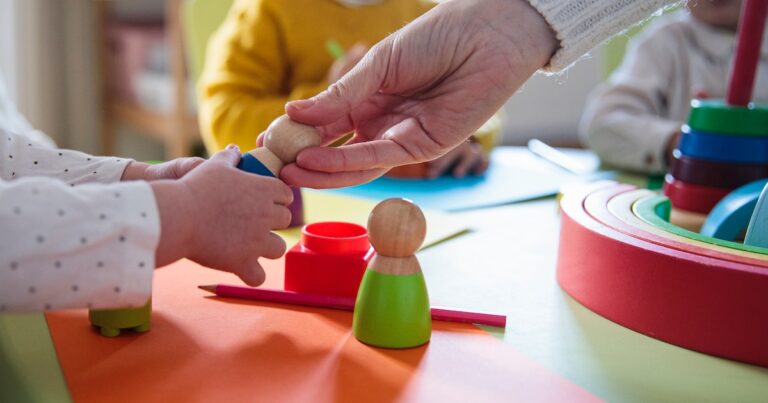
[ad_1]
Being a career parent has its pitfalls, including the guilt that can sometimes come with dropping off the kids at daycare every day of the week. Fortunately, for any parent experiencing this guilt or getting an earful from an unhelpful mother-in-law about how daycare can make a child aggressive or mean, that doesn’t seem to be the case.
According to a new study from the Institute of Early Childhood Policy at Boston College, a larger amount of time spent in childcare centers did not correlate with any negative behaviors like hitting, biting, or bullying. In fact, the study found some positive connections between kids spending time in daycare and their behavior down the road.
“The fact that we find no relation between spending time in center-based care and children’s externalizing behaviors is reassuring for parents, given the current trends in child care use and parental participation in the labor force,” said study author Catalina Rey-Guerra.
The study looked at more than 10,000 toddlers and preschoolers who took part in seven studies about child daycare from 1993 to 2012. While comparing the data, researchers found that as kids got older, they tended to spend more time in daycare centers, but this did not have any tie to an uptick in unwanted or negative “externalized” behaviors outside of the daycare, like hair pulling, picking fights, or restlessness.
“Our findings speak to both the direct positive effects that attending child care might have on children and also to the indirect positive effects through parents being able to participate in the workforce without the fear of any harmful effects to their child,” Rey-Guerra told UPI.
Previous research had suggested otherwise, but Rey-Guerra noted that “the vast majority of studies done are purely ‘correlational,’ leaving open many alternative explanations as to why children who spend large amounts of time in center care could be at risk other than center care per se.”
This means that a number of other factors, like the friendliness of the daycare staff, whether or not the center is understaffed, or the cleanliness of the center itself, could be a reason why kids who spend a lot of time in daycare act out.
It’s also important to note that the notion that dropping off a child at day care every day of the week can lead to behavioral problems as an inherently sexist one. Carol Weitzman, MD, a pediatrician in the Division of Developmental Medicine at Boston Children’s Hospital and associate professor at Harvard Medical School, explained how previous studies could have been faulty due to societal expectations of mothers.
“One must wonder if there’s an underlying bias that children not in maternal care will fare worse and there will be threats to attachment,” Weitzman told WebMD. “When women comprise approximately 50% of the U.S. workforce, our questions should be about how to ensure quality and affordable care for all children and how to establish and enforce child-friendly parental leave policies.”
Ultimately, a parent has to do what is best for their family in terms of childcare. Sacrificing a career to eliminate the guilt of using day care, for example, could lead to resentment, acting as a disservice to everyone. Whether it’s a day care, a family member, or a neighbor, the best day care for a child is the one that works for every member of the family.
[ad_2]